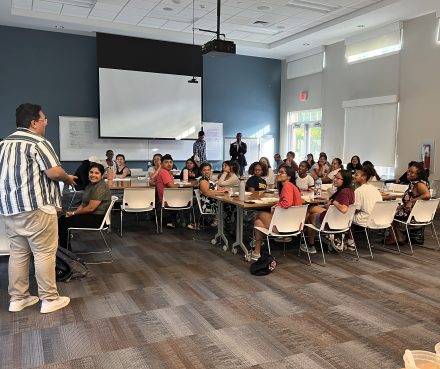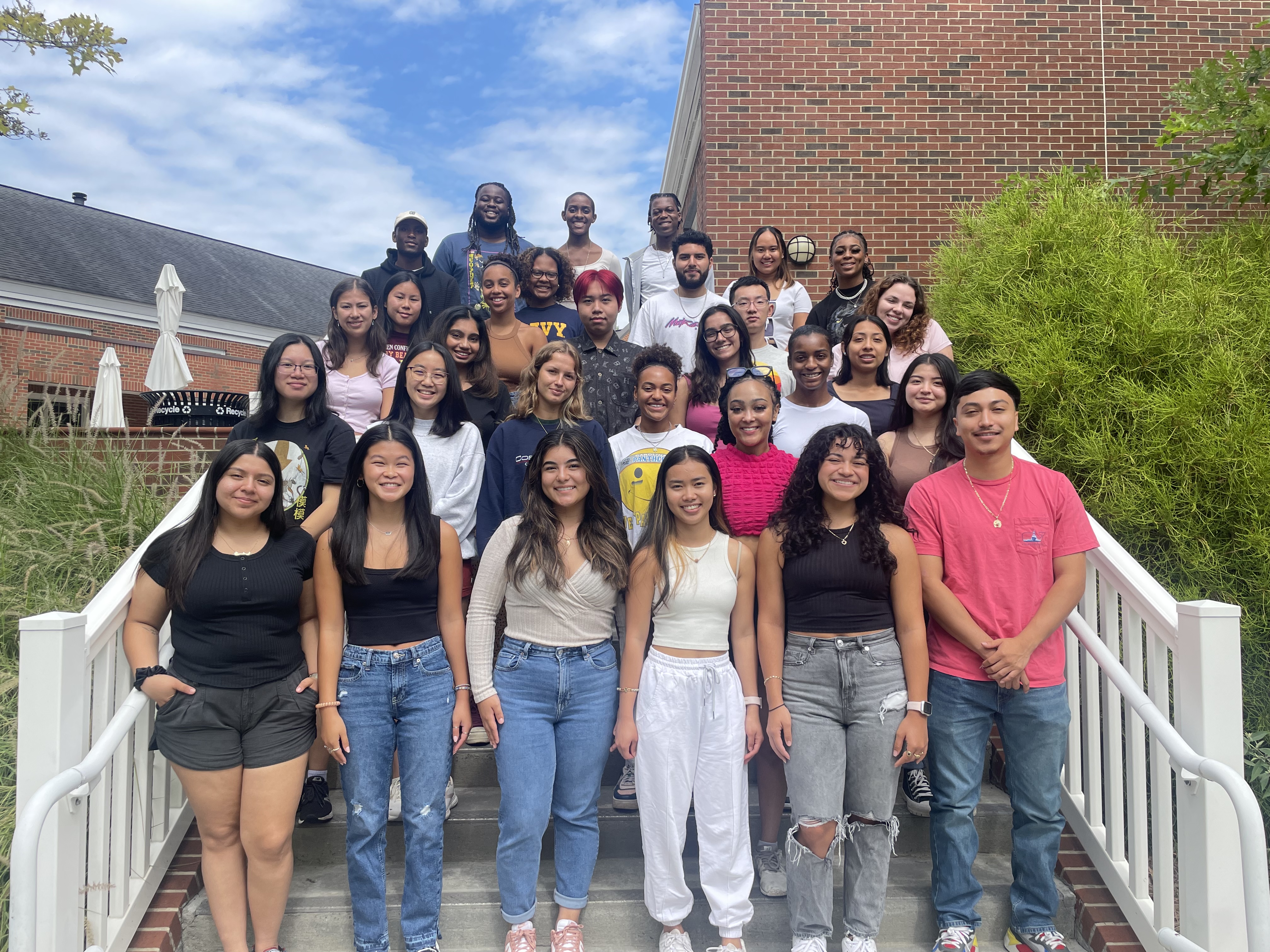The SMART Mentoring Program is open to current students who want to be peer mentors for incoming first year students. SMART aims to connect first-year and transfer ALANAM students to mentors on campus. Through a new pilot program this year, the program has expanded to include faculty and staff and offers to provide peer support that is the hallmark of the program to professional colleagues at Elon.
The SMART Mentoring Program was established in 1994 by L’Tanya Richmond as a signature program of the Multicultural Center, now the Center for Race, Ethnicity, & Diversity Education (CREDE). Initially designed to support Black students, the Student Mentors Advising Rising Talent (SMART) peer mentoring program has evolved into a program with a longstanding record of supporting ALANAM students (African-American/Black, Latino/Hispanic, Asian, Pacific Islander, Native American, Alaskan Native, and Multiracial) in their first year at Elon.
Upper-class students serve as peer mentors and assist students in making a smooth transition from high school to Elon by providing guidance and support while educating the campus community on the complexity of being a student from ethnically and racially diverse backgrounds. Now Elon has expanded the program to allow faculty and staff to become more involved in supporting the mentoring relationships fostered through the program.
SMART seeks to connect first-year and transfer students of color to peer mentors on campus with similar backgrounds. Now, the program provides these students with the option to connect with faculty and staff from similar backgrounds as well. This opens more connections and chances for first-year and transfer students of color on Elon’s campus. Along with building connections, the program aids students in their academic and social engagement at Elon, which can ease their transition into a new environment.
The new pilot program is allowing faculty and staff the opportunity to provide guidance to approximately 50 mentees. The pilot focuses on developing programming to enhance the cultural competence of the peer mentors and strengthening faculty and staff engagement with the mentees. The pilot program started with a dinner introducing faculty and staff to SMART mentors and offering them an opportunity to engage during a learning session. It was the first time some faculty and staff had been involved with SMART mentoring, with some saying they had previously heard of the program but didn’t know much about it.
Peer mentors will complete the Intercultural Development Inventory and will complete activities throughout the academic year to develop their cultural agility. Activities include journaling, interactions with CREDE staff and more.
The pilot program stems from the work of the Mentoring Design Team led by Dean of Inclusive Excellence Jonathan McElderry and Sylvia Muñoz, assistant dean of students and CREDE director, to bolster the mentoring in meaningful relationship work inherent in the SMART Mentoring program.
Naeemah Clark has mentored in different ways while being an Elon faculty member. She heard about the SMART Mentoring Program while she was teaching at Elon and watched it change as the years went on. Muñoz sent an email to Clark about the new pilot program for faculty and staff.
“I said, ‘This sounds innovative and energetic, and yes I do want to be a part of it,” said Naeemah Clark, associate provost, academic inclusive excellence professor, cinema & television arts.
As an Elon faculty member, Israel Balderas has focused on building mentoring relationships with his students, and he understands that mentoring can occur in a variety of ways. The excitement of those involved in the program made participating in the pilot appealing, he said.
“It’s what I saw — students excited about being there, being part of this program,” said Assistant Professor of Journalism Israel Balderas.
The SMART Mentoring program uses a “house model” that explains the roles and responsibilities of mentors, mentees, and faculty and staff members. The roof of the house is the mentor, who focuses on personal and professional development as well as community engagement. The body of the house is the mentee, who focuses on professional development, community engagement, social wellbeing and academic identity. The grass the house sits on is faculty and staff relationships, which help nourish the connections that occur.

The pilot program highlights two main components for including faculty/staff, said Sylvia Muñoz, assistant dean of students and director of CREDE.
“One component talks about mentors, and we go back to these personal and professional development part(s) of mentors. And we are doing it by really testing in a way and providing tools for them to increase that cultural competency,” Muñoz said. “Now, the second part of the program is the ALANAM faculty and staff engagement.”
SMART mentors are all about welcoming, teaching and learning. The program provides an opportunity for ALANAM students to build long-standing relationships in small or large groups.
“I enjoyed the thoughtfulness and the creativity behind each of the teams. It was clear a good amount of work and thoughtfulness had gone into each team’s mission and the way they would like to introduce themselves to incoming students,” said Assistant Professor of Music Theatre Courtney Liu.
Liu said that as a student, she benefitted from programs that supported mentorship, and now she gets to play a role through the pilot program. “There was a real sense of purpose in what the students who were mentors were doing and that this program had really meant something to them,” said Liu. “I was a part of some programs like that when I was an undergrad, and they’re really beneficial.”
Including faculty and staff in the SMART Mentoring program is intended to help in their pursuit of developing and maintaining meaningful relationships. Mentorship is very important on Elon’s campus. It’s ingrained in students, faculty, staff, and everyone around. Mentorship helps relationships flourish; they are important for individual experiences at Elon.
“I’m a big believer in the model that Elon has for faculty members. Teacher, mentor, scholar. Elon thinks of mentoring at the same level of scholarly work, and teaching,” Balderas said.
Balderas said that to him, mentoring is about developing lifelong relationships. “Elevate it to the point that we’re spending one one-on-one time with a student and saying, ‘I see you; I value you; I listened to you. How can I help you?'” he said. “My role is to say, ‘Are you the kind of person that wants to be an agent for change?”
The Learn theme within Boldy Elon, the university’s 10-year strategic plan, talks about setting the standard for mentoring and engaged learning. Elon always looks to improve in every element and with this plan, mentoring will create a high-impact experience for students, faculty, and staff. Students will build a lifelong network of mentors that will help in various ways. SMART aligns with Elon’s intention to develop a four-year mentoring model that allows students to develop a constellation of peer, faculty, and staff mentors.
The SMART Mentoring program is just one way of fostering mentorship at Elon, and the new addition of faculty and staff to the effort is designed to enhance the relationships that develop. “Mentorship looks different to different people at different times. There’s lots of different ways that you can build relationships,” said Clark.



